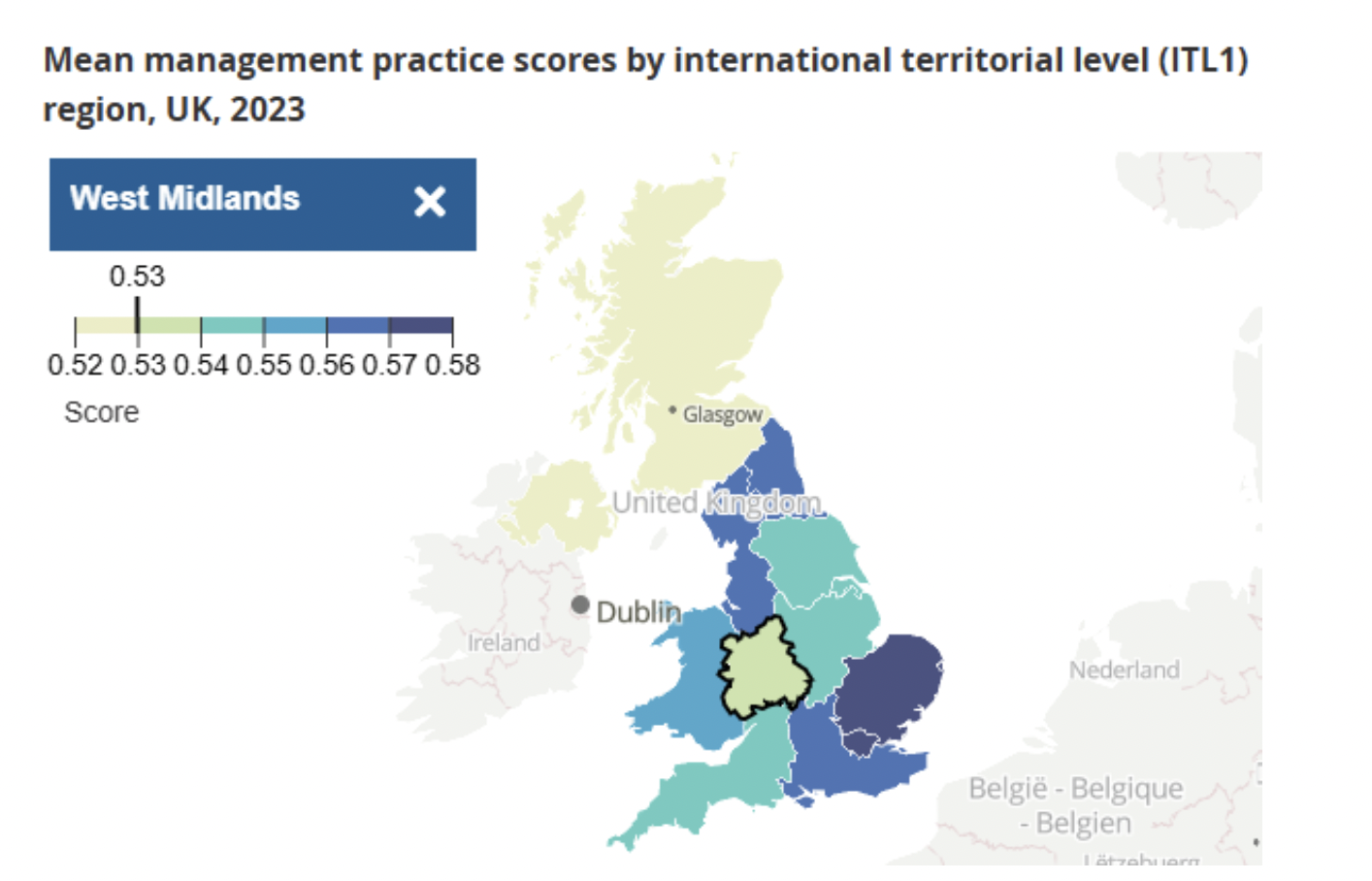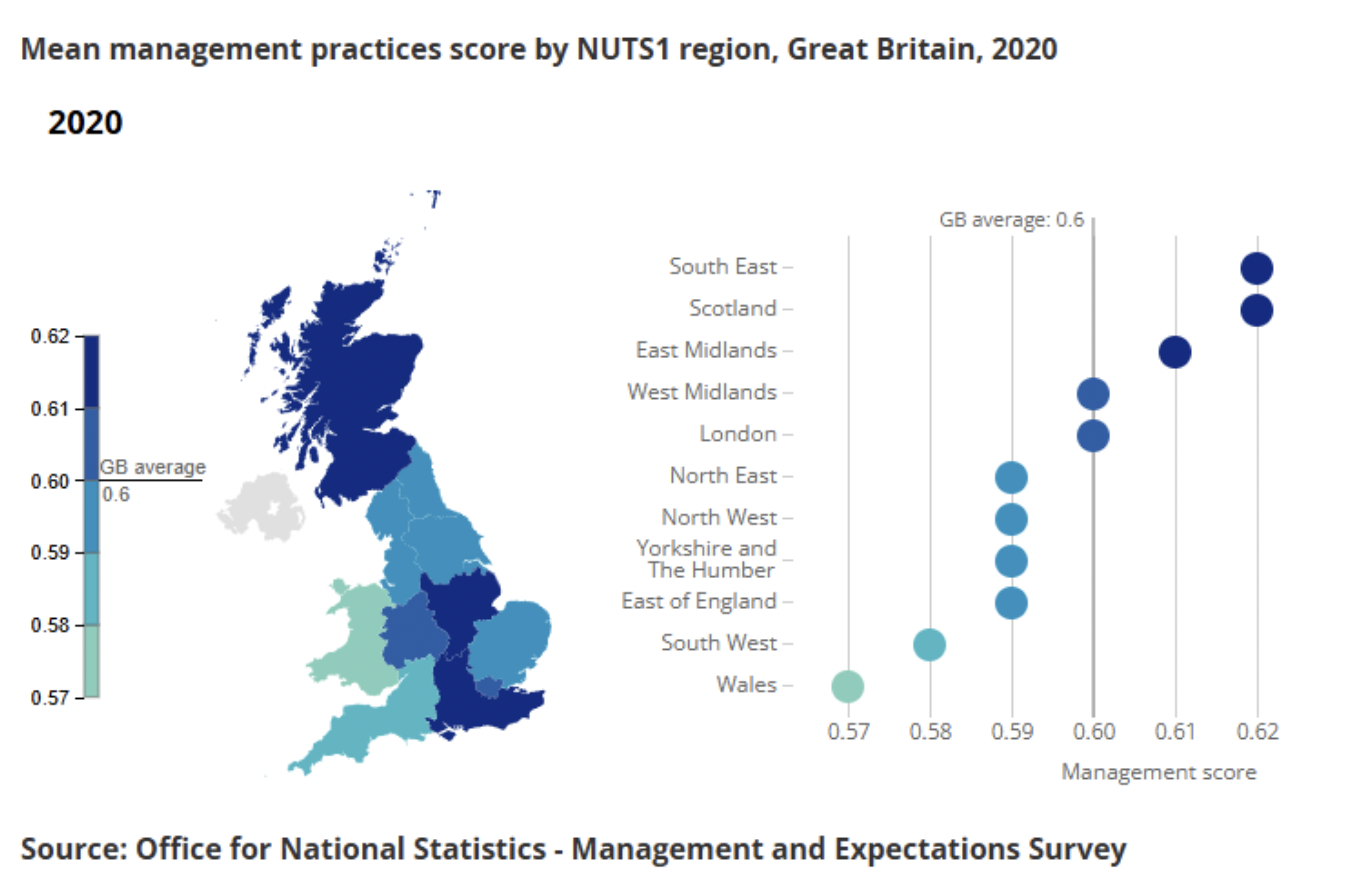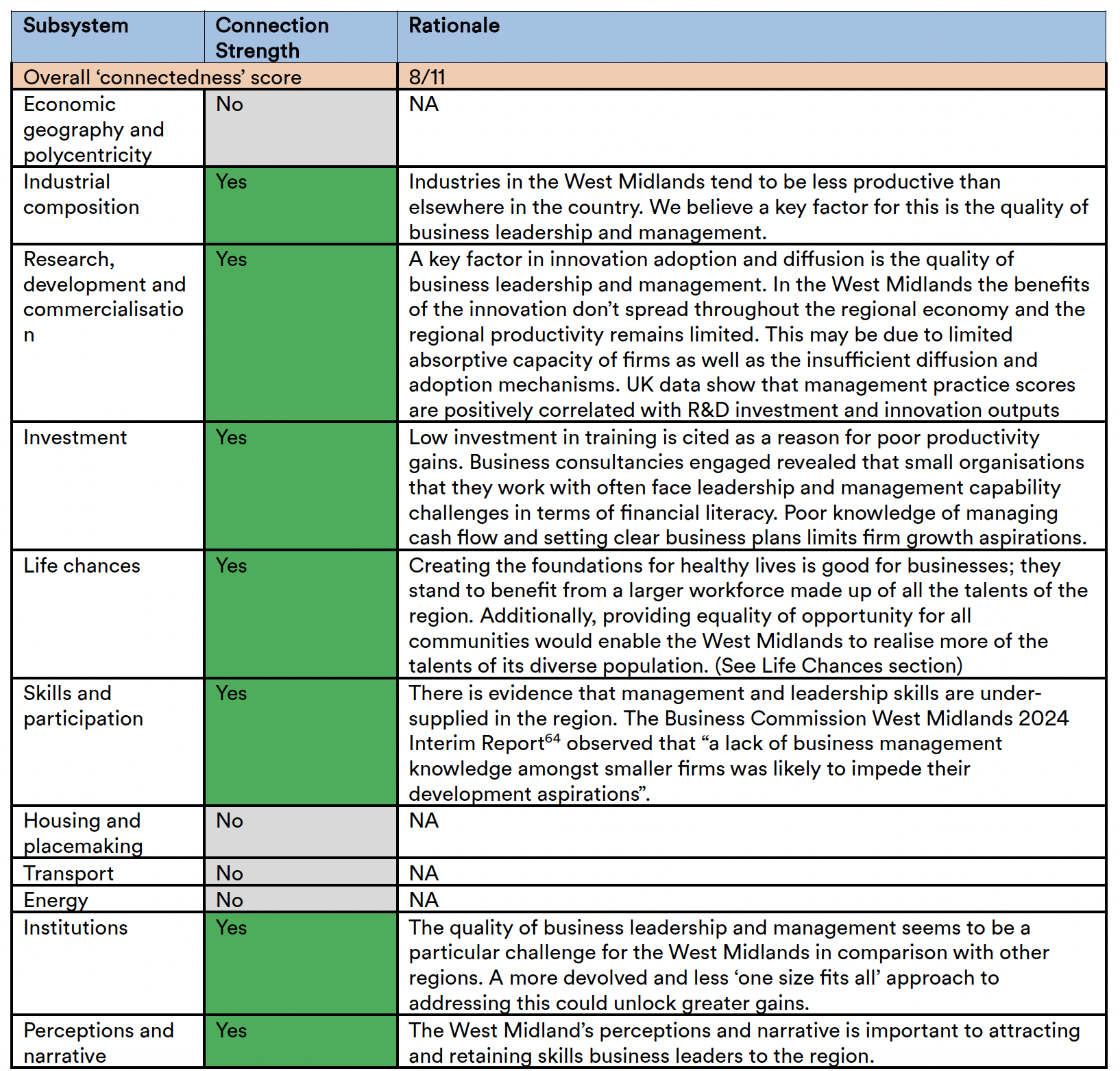Section 4.4: Business Leadership, Management and Technology Adoption
Hypothesis:
Business leadership and management in the West Midlands is a distinctive regional challenge. Linked to this, technology adoption by businesses is a high priority for regional productivity and future investment.
National and international evidence shows that better management leads to increases in productivity. Bloom and Van Reenen (2007) highlight that weak management practices contribute significantly to productivity disparities across firms and countries, with UK firms lagging behind due to a long tail of poorly managed businesses. They find that better-managed firms exhibit higher productivity, profitability, and survival rates, with stronger competition and professional leadership improving management quality. A 2024 report from the Enterprise Research Centre reinforces these findings, revealing that a majority of UK workers are employed in firms with below-average labour productivity, with significant gaps between top- performing and median firms. The literature also unpacks what good business leadership and management means:
- Processes for continuous improvement and development of new products and services to maintain competitiveness. An Office for National Statistics study combining the Management and Expectations Survey with R&D and innovation surveys found that better- managed British firms are more likely to engage in R&D and introduce new products or processes, even after controlling for firm size, industry, and other characteristics;
- Effective people management, with emphasis on HR practices that foster employee development and satisfaction with regular performance reviews, training employees and basing hiring and promotion decisions on merit;
- Data-driven decision-making, utilising data analytics to inform decision-making and optimise operations;
- Strategic investments, with deliberate allocations of resources towards areas with potential for significant returns; and
- Unobservable organisational factors such as inspirational leadership: leaders who motivate and guide their teams effectively.
On the surface, data suggest there is significant room for improvement in business management & leadership in the West Midlands. While differentials are not large, the Office for National Statistics (through the Management Expectations Survey which covers businesses in production and services industries with employment of at least 10) finds the wider region has the lowest business management scores in England, marking a decline since 2020 (see Figure 18 below). A study by the Productivity Institute found a weakness in management competencies accounted for 30% of the international difference in productivity across the East and West Midlands.

Figure 18: mean management practice scores by ITL1 region

Figure 19: Mean management scores by NUTS1 region
Our theory of growth asks two further questions: (i) why do we think the West Midlands is in this position; and (ii) what might be done? On the first, we don’t believe there is any intrinsic reason why West Midlands business management is less capable than other regions or countries. We do, however, identify two explanations.
Firstly, national analysis shows firms in service sectors have a higher average management score (0.56) compared with the production sector (0.52) because of a longer tail of firms with lower management scores in that sector. The West Midlands has a relatively large production sector and within that, a sizable number of firms at tiers 3, 4 and 5 in supply chains. The dynamics of supply chain management can mean that those firms have less autonomy as they effectively deliver to specs and prices set by customers. Those firms have often evolved to be efficient at low margin work, while constrained investment and limited autonomy reduces the need for leadership and management skills. Therefore, we can distinguish between efficient management and business leadership that can help drive firms and regional activity higher up value chains.
Secondly, there is evidence of an under-supply of management and leadership skills in the West Midlands. According to Lightcast data between April 2021 and April 2023, a total of 177,965 managerial job postings were advertised but only 91,902 potential employee CVs with management skills were available at that time. Over a decade, Lightcast data shows an increase of 75% in demand for management skills and a 280% increase in demand for leadership skills listed as requirements in job postings. We know Recruiting staff with relevant managerial skillset appears particularly challenging in medium-sized companies. Low investment in training is cited as a reason for poor productivity gains. Business consultancies engaged revealed that small organisations that they work with often face leadership and management capability challenges in terms of financial literacy.
The region’s business leadership organisations are leaning-into this issue. The three Chambers of Commerce led the Business Commission West Midlands 2024 report which observed that “a lack of business management knowledge amongst smaller firms was likely to impede their development aspirations”.
What works is reasonably clear:
- Improving the training and qualification levels of UK and West Midlands managers, including help to apply skills strategically for small and medium sized companies.
- Clarity about the specific leadership and management skills and behaviours managers need to display and develop. One example is the Help to Grow: Management programme: a 12-week training initiative delivered through a network of business schools across the UK, with 12 modules and providing comprehensive support for SME leaders, including one-on-one business mentoring, peer learning, and access to an Alumni Network. The programme was designed to enhance leadership and management capabilities, equipping participants with the skills needed to implement changes within their businesses and drive productivity improvements. An independent evaluation of the programme found that: “the programme appears to be contributing positively to all individual outcomes set out in the programme’s Theory of Change, particularly those related to personal development: skills, knowledge and understanding, business planning and strategy, and networks and collaboration.
- Business owners having the confidence in the business environment to make long-term choices about value-enhancement and productivity.
Therefore, the priority is to create a genuinely business-centred supportive business environment, where firms embarking on major changes in their life cycle have access to good quality information—from peers, private sector or publicly-funded sources—which amplifies the benefit for the firm and its employees.
Innovation Adoption. While the UK ranked fifth out of 133 countries in the World Intellectual Property Organisation (WIPO) 2024 Global Innovation Index, it ranked 31st in knowledge absorption. A study by CityREDI on Productivity and Prosperity in the West Midlands (2020) found that differences in innovation adoption explained a significant portion of productivity variation between firms in the region. Firms that introduced new products or processes had notably higher productivity growth than those that did not. However, the proportion of such innovating firms in the West Midlands is lower than elsewhere; the 2023 UK Business Innovation Study puts the West Midlands as one of three regions with the lowest proportion of innovation active businesses in 2020-2022 (35%). While ‘new to the market R&D’ is covered in the Research, Development and Commercialisation section, a 2018 Enterprise Research Centre study examined the ‘new-to-the-firm innovation’ angle which found a link with effective leadership and management to drive the diffusion of new technologies and best practices. The dependencies are:
1. Creating culture of continuous improvement. Business leaders set the ambition and risk appetite for firms to be curious, explore external technologies and to overcome barriers like resistance to change should they arise.
2. Understanding intangible investments. Business leaders need to be skilled at understanding the return on investment of intangible investments, and what changes to business practices (e.g. training, retooling) are needed to minimise risk and maximise return.
3. Collaboration and partnerships. Business leaders can foster collaboration, both with other businesses and research/academic partners, which are vital for innovation. External capacity can help identify potential partners, navigate intellectual property issues, and structure effective collaborations, particularly for smaller firms.
4. Advocacy. A supportive external culture through business representative bodies, trade associations and civic leaders can improve the awareness of technologies that can be applied and practical steps businesses can take.
The West Midlands has, through Catapult centres and research institutes, a strong base of translational research for firms exploring new-to-market activity for relevant firms. Partners in the Black Country are currently exploring options to address the lower absorptive capacity across that local business base. The ‘new-to-business’ technology adoption is also dependent on the business leadership capacity of firms and approaches to business development. For example, the region’s relatively low wage base can mean the ‘tipping point’ of investing in automation technologies is different to other regions. Through interventions like peer networks, Help to Grow: Management, Made Smarter and the Business Energy Advice Service, there are examples of helping firms to adopt established technologies.
The Everyday Economy. Improving business leadership, management and technology adoption is not only important for high-tech businesses that are the most productive in the region, but also highly significant for the everyday economy. 63% of the West Midlands’ workers are employed in everyday economy under business models that typically seek to minimise labour costs through low-pay and time-management63. We define this as the ‘low road’ through which businesses can seek productivity gains in the short-term and improve the businesses bottom line, but, in the long-term, undermine business growth through encouraging worker churn, sustaining low wages and generating negative social outcomes that ultimately undermine the regional business environment. Strengthening business leadership and management capabilities, enabling them to take the ‘high-road’, and focussing on retaining, training and fairly compensating staff, should help generate productivity increases in the everyday economy and realise longer-term societal benefits. There are a number of further policy levers available to help shape the development of the everyday economy in the West Midlands.
These include:
- At a national level, the Government could set higher minimum standards and regulations such as those proposed in the forthcoming Employment Rights Bill.
- The WMCA and its local authorities could also play a role by: Setting stricter conditions around public procurement, grants and other forms of support; Using planning mechanisms to require local employment practices; Insourcing services; and Developing charters to promote job quality and good practices.
- Helping workers in the everyday economy indirectly through skills provision, improving accessibility through transport and supporting housing affordability and quality.
Connection with other sub-systems

Figure 20: Connection with other sub-systems
